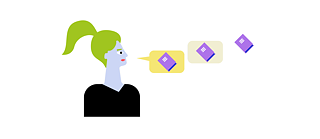In her final column, Ulrike Almut Sandig, who has translated many poems herself, pays tribute to two colleagues who have translated her poetry. The following is an excursion into English- and Georgian-speaking realms – and different ways of reading literature.
It might be said that there are two different ways of reading literature. One is to regard the text as a mirror, who spontaneously identifies with the narrator – which is often the first thing that draws us into a poem, story or novel. This way of reading my writing is a bit alien to me. Which is probably why I like toying with it – by changing my narrative voice as if running it through a vocal processor. Hello, it’s me – and then again not me!I am the landscape
One of my poetry books has the mile-long title I am a field full of rapeseed, give cover to deer and shine like thirteen superimposed oil paintings laid one on top of the other. It’s drawn from a poem that tries to conceive of identity as something older and bigger than oneself – a self we can share. This last brief trip across time and space is dedicated to the polyglot heroes who translate my poems. I’d like to mention two of them here.See Lea, mud-genii, greet Atlantis
Karen Leeder is my main translator. Leeder holds the Schwarz-Taylor Chair of the German Language at Queens College, Oxford, and has been translating my work into English for many years, as well as that of Durs Grünbein, Volker Braun, Raoul Schrott et al. She has long since become an irreplaceable member of the Landschaft family. Her English versions of my books show me a whole new way of reading them, one that explores the otherness of our related cultures and languages rather than levelling them out.In so doing, she sometimes ventures far away from the original text. It feels as though she were digging a seismic trench around the globe… only to end up where I stand. She once translated an anagram of mine into an English anagram – and without giving up on the visual resemblance on the printed page:
Late underdogs rattle in the home, ingest all. ‘Nu ein Ei’!
Hide it in a hat. Lea runs legend-lost to unreel teeming
data. Hello, in line! No suing the ultra-green tides. Meet
a satellite retinue hounding neater gold helmets in
to nature! genuine stellar lights, one alien theme. Did
someone tell a lie? Lea, treading dust, uttering her inn-
er need to linger: slum it, atone, still aged heath, ennui.
Latent turn made true. The Gili-isles inhaled. Gone. One
nitrate hell intuited, almond Lea’s egg rite unseen. Oh!
The North ill, undone. See Lea, mud-genii, greet Atlantis.
The tongue is a needle. And I am True North. Telling lies.
The Gili Islands are a group of three islands belonging to Indonesia and lie a few meters above sea-level. Five species of sea turtles lay their eggs on the sandy beaches there.
“The tongue is a needle. / And I am True North. / Telling lies.” Is taken from Emma McGordon’s poem “Magnetic”.
The anagram was published in: “Shining Sheep, Seagull Books: Calcutta/New York/London 2023”
My other selves
I have a hard time checking some of the translations because I hardly know the target languages – if at all. Like the Georgian translation of my above-mentioned Rapeseed book, which was recently published. The translator is Bela Chekurishvili, a poet, cultural journalist and PhD candidate in comparative literature at the University of Tbilisi. She’s currently studying at the University of Bonn. Her own poems, translated into German by Norbert Hummelt, engage with the Georgian poetic tradition, but go far beyond it. Here’s the opening of her poem “Safe Mode”:like a cell on death row, a farmer’s barn,
a widow’s memory, a PIN-protected credit card.
Temper-proof, reliable and with a warranty.
We’re reached agreement on what the best mode is.
My other self is protected from betrayal, my uterus from fertilization,
the house from being built.
Our literatures are related, but our languages are not. When translating my poetry, she’d often give me a call. Keeping the phone to my ear and my eyes on my dog in the tall grass as I sauntered down a riverbank in Poland, I’d talk to her about gender and biological sex, pigeons and Dove soap, idioms like “feathered and tarred pity” and untranslatable puns like “not a germ – any at all – to be found in Germany”.
A few months later, in May 2023, a book fair was held in Tbilisi. And all day long, I got tagged on the Facebook selfies of Georgian fairgoers holding the new book რაფსის ყანა ვარ, შვლებს ვმალავ და ვანათებ ისე, როგორც ცამეტი ფერწერული ტილო, ფენა-ფენა დალაგებული. I was delighted. I wasn’t in Tbilisi, and yet I was.
We’re the subtle difference
There are so many different ways of being read. Literature seems to be endowed with the superpower to break free from the author. A poem by someone I’ve never met and whose language I can’t read can nonetheless turn out to be a source of inspiration or consolation for dark hours. And a translation from a culture that is (as yet) foreign to me can alter my view of the world. We’re all similar, but not the same.Word! The Language Column
Our column “Word!” appears every two weeks. It is dedicated to language – as a cultural and social phenomenon. How does language develop, what attitude do authors have towards “their” language, how does language shape a society? – Changing columnists – people with a professional or other connection to language – follow their personal topics for six consecutive issues.
June 2024
